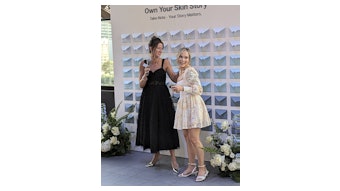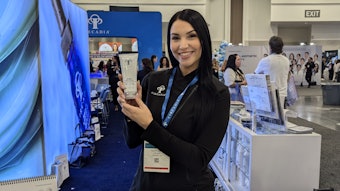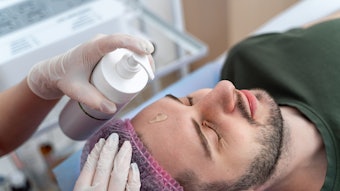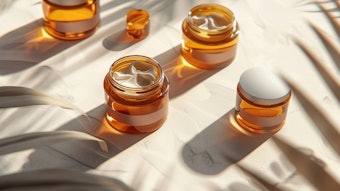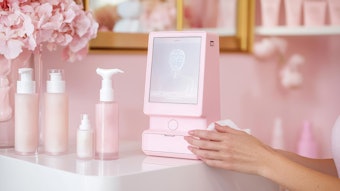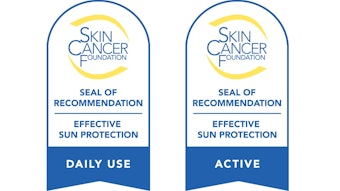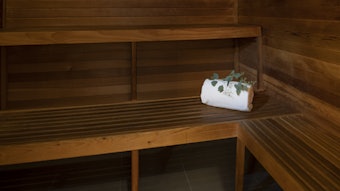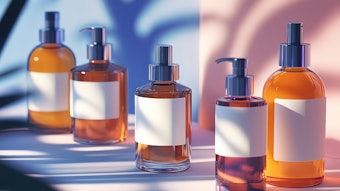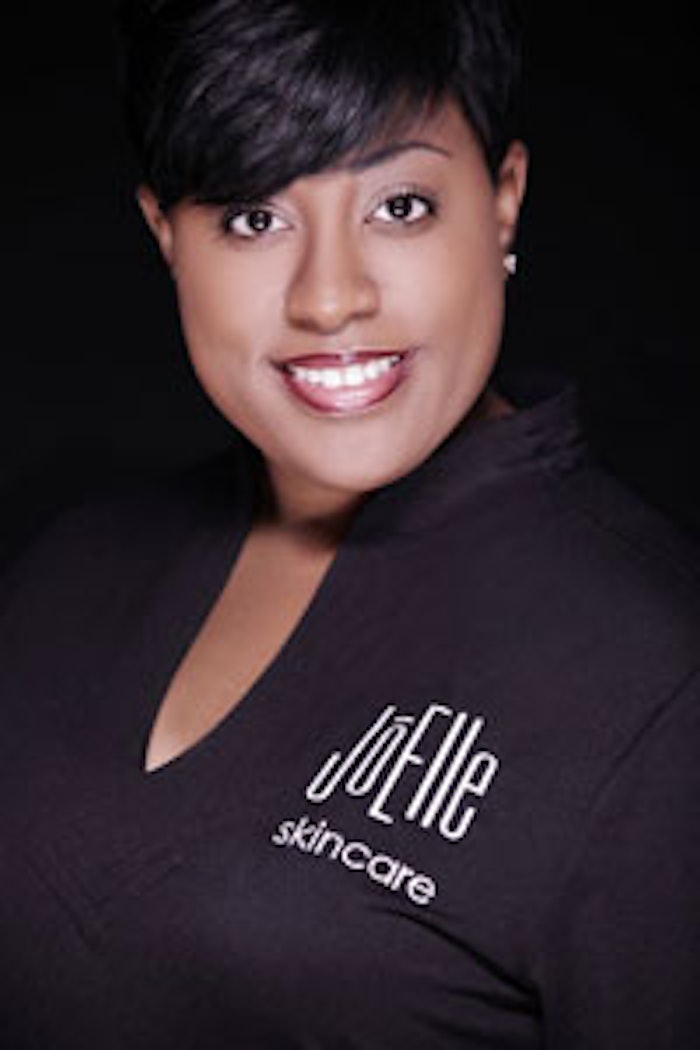
By Linda Harding-Bond
Linda Harding-Bond is an international spa trainer and principal of Moontide Consulting. She specializes in global skin and sales training for the spa professional.
JoElle Lyons-Lee is on fire! As a master esthetician with a new husband, new work location and signature product line, she is hot! By the way, did I mention that she is also the caretaker of Michelle Obama's skin?
I met with JoElle at Citrine, a very upscale salon and spa in Bethesda, Maryland, roughly eight miles northwest of Washington, D.C. The first thing that strikes you about her is her smile, the warmth of which reflects in her eyes. The second thing is her skin, which is virtually perfect and glowing. JoElle is a hugger and extremely gracious; after offering me tea and something fattening to eat, we got down to the business of the interview.
So JoElle, why skin and not hair?
I was always into beauty, even in high school. I would go to the drugstore and buy the masks, the cleansers, the body products, and my Mom used to comment, “What are all these things you’re buying?” I didn’t grow up in a family where the women got facials or spa treatments. But I would watch my Mom putting on her makeup; she would always say, "Never go outside without your face on." She made doing her face a ritual. My grandmother was big on that too, so “getting ready” was my first introduction to beauty.
What was your first introduction to spa?
I’m originally from Ohio, and when I moved to Chicago I lived in the Gold Coast area. The first week I was there I walked into a salon, and the esthetician who came out to greet me was a woman of color. She introduced me to treatments and I started getting facials regularly. At one point she recommended that I get my brows waxed too, so I said okay and I hated it. Of course a few weeks later when they started to grow out they were looking crazy. I went to a brow specialist/esthetician who was a Latina. So at the beginning, my introduction to esthetics was all coming from women of color.
I never encountered any other black women in the industry so your experience was very different from mine.
Yes, in the beginning everyone that I was exposed to was of color and had been in esthetics for about 10 years. One of my first mentors owned Bettye O Spa; my instructor in school was African-American, CIDESCO-trained; and the surgeon who came to our school to teach and whom I later worked with was black. The whole timing of my arrival in Chicago aligned me with experts who were people of color. And even my classroom situation was predominantly black. So I’m thinking that esthetics is a black thing. It wasn’t until I left Chicago and attended my first esthetics conference that I discovered differently.
How did you end up in esthetic school?
At the time I was attending Columbia University and waiting tables. The esthetician who gave me my facials had the most awesome place, and I would talk about beauty with her constantly. Finally I asked her to tell me what I needed to become an esthetician. She said that I should attend the Dudley Beauty College, which has one of the best programs in Chicago. The director of that school attended my wedding a few weeks ago; she’s one of my mentors and has been a huge influence in my life.
What’s her name?
Betty Clawson. And you know, everyone who has come to work for the First Lady is a graduate of Dudley Beauty College, including the makeup artist who now works for Oprah.
Did you feel as though ethnic skin issues were addressed in the curriculum?
Well the thing was, we didn’t have any white clients. The way I started to look at skin care was this; it’s the human body, the physiological makeup is the same, but different ethnic groups are susceptible to different things. For example if you’re African-American you may be more prone to hyperpigmentation or if you are Anglo Saxon you may be prone to higher degrees of sun damage and skin cancer. I look at the current condition of the skin, and I do my treatment and service based on that.
I think that’s a very healthy holistic way to handle skin, but the problem is that issues that commonly impact women of color are so often not addressed in the schools.
Well yes, most skin care is only marketed to white people anyway, not even Asians, Hispanics and darker-skinned Europeans. I was fortunate that I was exposed to both Milady’s curriculum and the medical end so I was a rarity. I didn’t discover until later that skin care education was geared to white skin, and it’s still not considered to be a prestigious career here in the United States as the beauty advisers are in Europe.
Tell me about your career path.
It began with the surgeon who came in to teach at our school. Physiology and Anatomy was a six- week course; the physician who taught it had actually specialized in ethnic skin in his schooling. He was doing new things like microdermabrasion and chemical peels, and he was the first doctor I heard say that you must detox and cleanse your colon or you’re going to break out. I thought he was great. When he finished the course at my school, I went to his office to try and apprentice with him; and his nurses would tell me the doctor already has an esthetician so go away. I went back the next day, and the next. And I kept going back until he saw me. When he asked me what my ultimate goal was, I told him it was to have him work for me. He was so impressed that he hired me and trained me for four years. I ended up as director of his skin care department where I developed my first skin care line for him.
Tell me where you’ve had your best facial ever?
I haven’t. I’ve never had a facial that blew me away where I’m like, “Girl, I have to go back to her!”
But isn’t that the irony of developing such a level of expertise? You think, “If I can’t get a facial as good as the one I give, why bother?”
Very true. A lot of estheticians come to me for facials. Some come to learn new techniques; some come because they really want the treatment. I don’t make it a point to visit estheticians in the same way; to be honest I feel nervous about what they’re going to do. I’ve dealt with so many people who have had facials and something has gone wrong. And I would hate as an esthetician to have something terrible happen to my face.
Our face is our billboard for what we do.
Exactly. There are three people I trust to give me a facial and all three live in Chicago. I did have some facials here in DC, and it was like having a facial at the esthetic school.
Yes, I’m sure. I only have one person that I go to. Did you tell them what you do?
No, of course not. Sometimes it comes up afterward.
Yes, in Philly I‘ve visited the five-star hotels and several “Best Of” winners and have always been disappointed. I find the level of knowledge with ethnic skin is low.
Yes, I understand. I recently had a facial with a “Best Of" winner as well, and I had to give feedback. My problems stemmed from her being 45 minutes late, to my treatment being so bottom of the barrel and to her constantly telling me how great she was. I let her know from start to finish how unprofessional she appeared to be.
You did her a favor.
Well, I don’t know if I did or not, but I couldn’t let her continue in the same way.
So what would your advice be to young estheticians currently in school?
It upsets me that so many states don’t offer continuing education so they must take advanced classes. It will separate them from the rest. Training doesn’t end after you get your license. You can never stop learning about the field of skin care be it ingredients, products, services, skin types, all of that.
What responsibility do you think the esthetics industry has to educate on a wider range of ethnicities?
Well, first of all, you’ll find the bulk of people of color having and delivering services in major cities. Let’s begin with the cosmetology boards in those cities. They need to increase the hours for esthetic training. I did an initial 750 hours, another 1000 hours to get a teacher’s license and felt as though I could have easily used another 1000 in foundational education.
So you don’t think the 300 hours required in certain states is sufficient?
Well, I don’t know what they could learn in that time. Maybe working at a corporate spa is different because it’s more about what you sell, not so much the service.
But the estheticians at hotel spas are not taught sales skills or engagement either. They’re taught product knowledge. We both know it’s not the same.
I think the hotel is saying, look, our customers are transient anyway. They’re in and out; they probably have their facialist at home. And here’s the other issue; most estheticians go somewhere to work and there’s a manual. And they read if the client’s skin is a certain type, then they should do this facial. And if it’s another type, then they should do that facial. I call them cookie-cutter estheticians. And the five star hotels and signature brand spas are like factories. I think it is necessary to teach the estheticians to do a quick accurate skin analysis so that the client leaves feeling educated and buying products based upon knowledge,, not just someone selling. But honestly I’ve taught many students, and I find that a relatively small percentage of girls are really doing what they want to do anyway.
Really? Why do you say that?
Many girls are taking esthetics for two reasons. Someone has said that they can make money after taking the class for a short time or their parents have said, “You’re not going to college, so find a trade to support yourself.” But it’s not their passion. Every now and then I’ll meet a passionate esthetician. And I’ll know because she has been learning her craft!
Wow, this is interesting.
Listen, everyone who is passionate has a story about how they got to a certain point. You knew what you wanted to do, no second guessing. When I was teaching I graduated abou10t girls. Only one is still involved in esthetics. One! Because here’s what they find out, “OMG, I’m going to have to do something to get clients?” And then, “OMG, I’ve got to do something to keep them?
Yes the level of service is definitely an issue. I have six African-American attorneys who moved to DC when the President was elected, and they still come back to me for their facials. I didn’t understand why at first because DC has major five star hotels, and it’s such a diverse town. But ethnic skin knowledge is rare.
Look, I have so many clients who had been around DC everywhere looking for good service. And Chicago was very different. The esthetician’s were toe-to-toe. It’s very competitive there and the quality of service reflects that.
I believe it. You have a very ethnically diverse clientele, what impact has that made in your career?
Being exposed to everybody really helped me to develop my products.
Yes, let’s talk about your skin care line, the conception, where did this come from and how long ago.
Well the conception started four years ago because I really started studying chemicals and harmful ingredients being used in skin care, so I got all caught up in what we really put on our skin. I was using SkinCeuticals and a lot of the medical-grade products.
What was the impetus for this?
I never felt totally confident in what I was recommending to clients or what I’d used on me. I needed to develop something that I was totally committed to. So when I tell you to use it, I know what’s in it, I believe in it and I like using it on you.
I got very excited when I started reading about your ingredients and saw all of the alpha hydroxy acids.
Yes and what’s nice about my line is that I didn’t use any fillers, parabens, sulfates, or preservatives. They’re loaded with peptides too. I wanted to create something so that when we put the ingredients in the bottle in their most powerful state, there would be nothing to dilute the potency. This was important to me. And these products work fast. People see a difference sometimes in two days. My products are made in a French lab in Canada. And they’re made to order in small batches.
Are they skin-type specific?
No, I don’t skin type on my products. I tell my clients that we’ll talk about the current condition of their skin because it can change throughout the entire year depending upon if they’re going to be traveling, or their hormones change or they change products. When my customers saw my products, the first thing they said was, “JoElle your product doesn’t have a type.” I would tell them to simply read what the product was for.
Where can the products be purchased?
Here at Citrine and at another spa in Chicago. I launched the brand two years ago very quietly because I wanted the opportunity to tweak it. But people are reordering it and I’m getting oversea orders. People are buying it for their friends.
Word-of-mouth is the best PR. I want to shift gears here for a moment, JoElle. A few weeks ago I attended a skin care class where I met a young African-American esthetician and I told her about my upcoming interview with you. She asked me if you were black and when I told her yes she started to cry. How does that make you feel?
Well, I’ve had people cry when they visit me because I do Michelle Obama. I’ve had people, black and white, cry because I touch her and now I’m touching them. But for women of color in the industry particularly, it’s emotional.
JoElle, you’re living in history.
But you know, of all the estheticians in the world, this happened to me. When I left Ohio that day, I just knew that I didn’t want to live in Ohio anymore. I knew nothing about esthetics. And then things started to happen, one right after the other. So sometimes I think that people are chosen; like President Obama, I think that he was chosen, that he was preordained for his task.
Yes, outside forces sometimes come together, but if you’re not paying attention it still doesn’t work. You were receptive. What’s in your future?
I’m ready to go beyond esthetics, into health and wellness. I really want to start a training program for estheticians to educate other estheticians using my skin care line; using The JoElle Method. When I'd go to Vegas and train on platform, I loved it. I’d also like to do a show called "Living Well With JoElle," a lifestyle program. And another set of products would be created for that.
I can see you doing that, thank you for your time.


